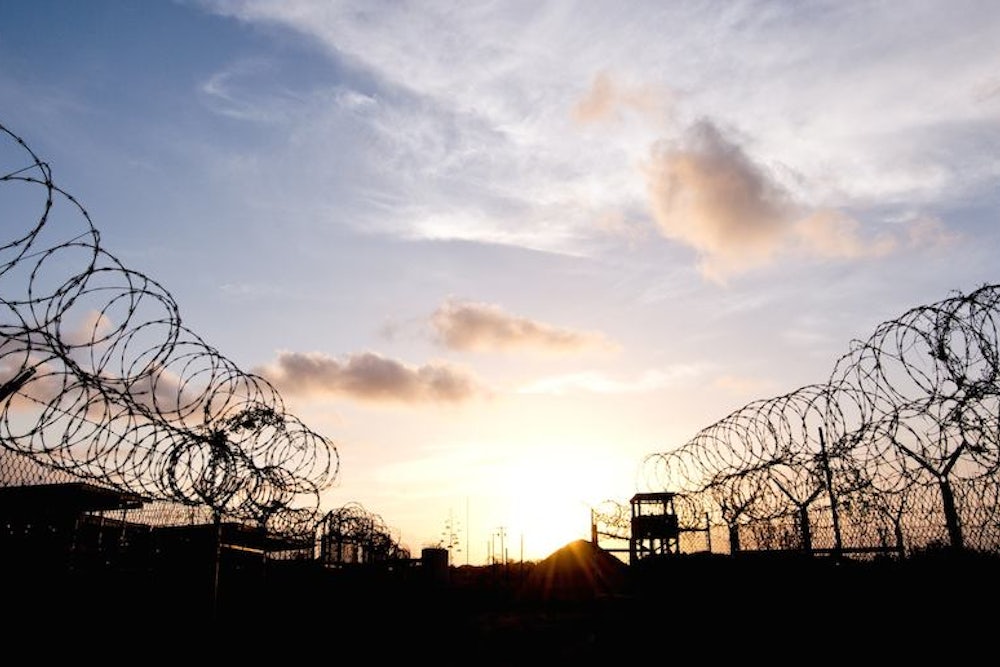GUANTANAMO BAY NAVY BASE, CUBA—We have a problem at Gitmo. It’s time for Judge James Pohl, the army colonel in charge of the 9/11 trial, to reassess the process.
Six sprawling legal teams, one judge, ten victims’ family members, ten reporters and many more observers travelled to Cuba this week to settle a primary question everyone already agreed upon: Whether Ramzi bin al Shibh, one of the lesser 9/11 defendants, was fit to stand trial. They never got to it. In fact, they somehow ended the week further from a trial than they started.
In previous hearings, Al Shibh interrupted the proceedings with complaints of strange noises and vibrations in his cell, but his defense lawyers say he's fit for trial. The prosecutor, Army Brig. Gen. Mark Martins, agrees, and the legal system presumes competence unless proven otherwise. But Martins insisted that Judge Pohl hear arguments anyway, presumably so the matter is not used against him in any future appeals. (Despite their agreement on the result, the lawyers argued incessantly about procedural technicalities.)
Judge Pohl eventually decided it was just too ridiculous. He refused to hear full arguments, and ruled the presumption of competency stands.
If this were just a fluke week, we could end there. If we could just catch up next week, then no big deal. But Al Shibh and the other 9/11 suspects’ trial is totally off the rails. The next hearing won’t come until June. The last one was in December.
Step back, and it gets worse. When alleged September 11 mastermind Khalid Shaikh Mohammed and four others were arraigned here in May 2012, their trial appeared at least a year or two away. Two years later, it appears yet another year or two or more away. KSM has been in custody already for eleven years. The families of the victims of September 11 and the country deserve resolution.
And yet resolution is nowhere in sight: The docket in Judge Pohl’s courtroom this week included nearly 20 additional issues to address once competency was established. We never got to them, either.
Instead, Al Shibh’s defense team began the week by accusing the FBI of trying to enlist one of its members as an FBI informant—a development that caught everyone unaware. What we know for sure is that two FBI agents questioned a key member of one defense team. Depending upon the extent of the FBI’s investigation—still completely unclear, to everyone in the courtroom—it could raise serious conflicts of interest for the defense lawyers with their clients. Thursday, Judge Pohl announced that he had appointed a special prosecutor to investigate the extent and impact of what he called “The FBI issue.”
Special prosecutors inevitably drag on and on—it’s hard to be thorough quickly. At the very least, it seems reasonable that the new investigation will consume the trial’s next session, slated for a single week in June. If that goes extremely smoothly—and it is very unlikely to go smoothly—the court will convene again in August. By then it will have been eight months since the last productive session last December. (The February session was cancelled.)
I am new to this case. I don’t understand all the particulars, not by a country mile. And I get that it’s hard. There are a lot of thorny issues to untangle. The prosecution and defense teams each conducted press conferences after the recess, Thursday, and I asked them each: Is this working? Are there structural problems here? Is there a better way to do this?
They gave a lot of reasons for the delays, particularly the defense. Al Shibh’s lawyer James Harrington said much of the investigative work had to be done in 17 countries overseas. “We have been to seven,” he said. James Connell, a lawyer for Ammar al Baluchi, enumerated the logistical hassles of getting to and working at Gitmo. (Anyone who’s made the trek one time can attest to that.)
There is also one massive looming issue, which Connell returned to all week: “The three or so years of my client’s life where he was under CIA custody.” He and the other four defense teams contend that the U.S. government needs to come clean on exactly if, how, and when it tortured their clients—and then defense attorneys can begin the real process of building their cases.
They may get their wish. In a stunning development, The Miami Herald reported this morning that Judge Pohl just ordered the CIA to release details about its black sites in the USS Cole bombing case, including names, dates and places. The implications for the 9/11 case could be staggering. But the effects won’t likely be felt until the discovery process really gets going. Here were some suggestions from the lawyers, families and reporters on how to expedite the process:
- Return to monthly sessions, as they were conducted briefly last fall.
- Meet for two weeks at a time instead of one.
- Limit the time the attorneys can devote to other cases.
Or more radically:
- Move the proceedings to somewhere accessible.
- Sequester everyone in one location for an extended period. (Perhaps a handful of extended periods.)
- Sever the case into five separate trials. (A longshot, as it requires the defendants to agree. Now that they’ve experienced the gridlock, perhaps they will reconsider.)
It’s up to you, Judge Pohl. Are you satisfied with this pace?
